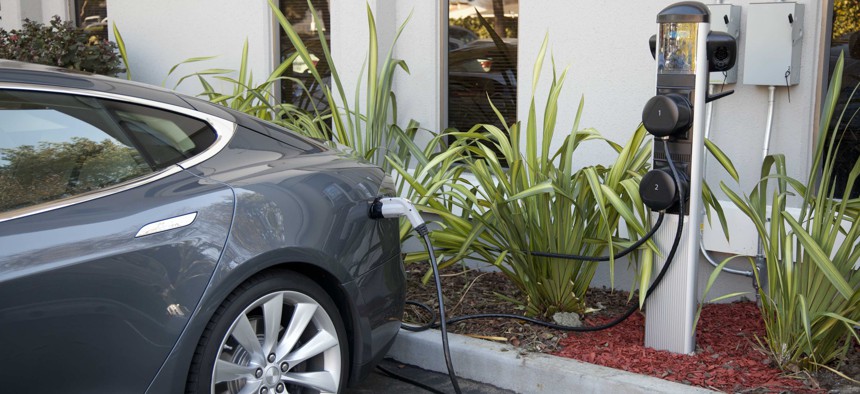The Benefits and Challenges of Electric Car Policy

iStock.com/JasonDoiy
At an annual summit of transportation policymakers, local and state leaders discussed the future of transitioning from gasoline-fueled vehicles to electric-powered ones.
Moving from gasoline-fueled to electric vehicles presents complex infrastructure and policy implementation for states and cities, said transportation policymakers who gathered Friday for the annual Mineta National Transportation Finance Summit.
The summit, hosted by the Mineta Transportation Institute and the Commonwealth Club of California, addressed the challenges cities and states face as they try to transition their fleets and residents’ cars and trucks from gas to electric. Infrastructure, public-private partnerships and equity issues are some of the difficult questions summit panelists highlighted about the transportation energy shift.
The challenge of installing electric-vehicle chargers in buildings and single-family homes, electric grid failures and security risks were some of the obstacles mentioned.
Cost also is a big factor. “The costs to upgrade the electric grid and to allow it to carry the amount of electricity that’s going to be required to essentially replace gasoline will be astronomical and have yet to be quantified,” said Carl Guardino, executive vice president of government affairs and policy at Bloom Energy.
The panelists also addressed the transition from a fuel-based revenue model to options like mileage fees, carbon taxes and higher vehicle registration fees, or a complete shift away from user-generated revenue. Although every revenue source is viable, the panelists pointed out the positives and negatives of each option.
For example, Asha Weinstein Agrawal, director of the MTI National Transportation Finance Center, highlighted the disproportionate effect mileage fees have on low-income Americans and how low-income households can have difficulties paying annual mileage costs. But Agrawal also pointed to an annual MTI survey that shows that “roughly half of Americans agree to some form of a mileage fee.”
The Mineta event took place as states and the Biden administration begin a push to rapidly electrify vehicles to help mitigate climate change and as states and the federal government rethink how to fund transportation infrastructure and services.
When discussing the major factors of switching to electric vehicles, the transportation experts emphasized equity, decreasing pollution, raising revenue and congestion. Getting public buy-in and the challenge of governments transitioning to electric vehicles are other obstacles that will take time to overcome, according to summit panelists.
“Adaptation and behavior trends, in fact, are one of the highest priorities and necessary elements for an effective and smooth transition to electric vehicles,” said keynote speaker Toks Omishakin, director of the California Department of Transportation, known as Caltrans. “Mindset and behavior go hand-and-hand with this transition.”
Brent Woodie is an associate editor at Route Fifty.
NEXT STORY: Cities Struggle With Housing Pressures As Pandemic Wanes





